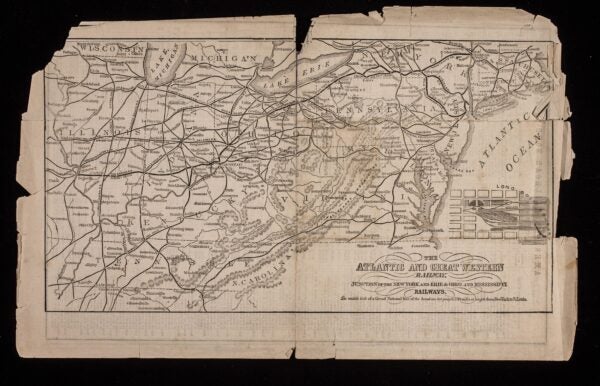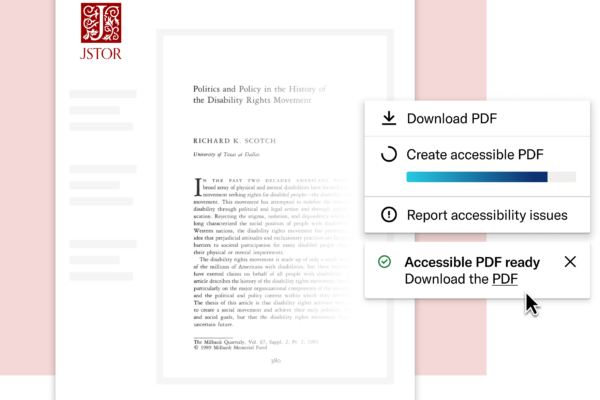
Here at ITHAKA, a nonprofit organization dedicated to expanding access to knowledge worldwide, we’re committed to partnering with libraries, publishers, and museums to reduce costs, extend access, and preserve scholarship for the future as affordably and sustainably as possible.
Through extensive discussions with library partners, we identified a common and significant opportunity. Libraries, archives, and similar institutions have committed substantial resources to curate and maintain their digital special collections, which lie at the heart of their missions and have the potential to serve their local communities and reach a global audience. However, there is a growing need for broader access.
Common challenges faced by institutions
Despite institutions allocating substantial resources to develop their digital collections, a consistent challenge remains: the limited discoverability and utilization of these digital assets. This issue has resulted in valuable resources remaining relatively hidden, primarily accessible to only a small group of researchers, educators, or students who are already aware of their existence.
The seamless integration of digital collections into research and teaching workflows is a notable challenge. These collections are not readily available on platforms commonly used in academic research, creating a significant disconnect that hampers their smooth integration into scholarly activities. Despite substantial investments in their curation, this remains a barrier, hindering broader accessibility and usability of these valuable digital resources. Additionally, digital collections often exist in isolation from other repositories and secondary sources, making it challenging to fully comprehend and contextualize primary source materials, which is especially problematic for students who rely on diverse resources for their education. This emphasizes the need for improved integration.
Maintaining digital collections requires ongoing investments to remain aligned with evolving library needs. This involves not only staying current with the constantly changing academic resource landscape, but also ensuring that these collections remain accessible and pertinent to researchers, educators, and students. It is a multifaceted endeavor, encompassing a dynamic response to several critical areas of concern:
- Long-term preservation: The task of long-term digital preservation casts a long shadow, as many institutions grapple with allocating the necessary resources for the sustained safeguarding of their digital assets, despite the universal recognition of its importance. These collective challenges highlight the need for a comprehensive and transformative solution that can bridge the gap between institutional aspirations and the practical realities of managing digital collections.
- Accessibility mandates: Staying compliant with accessibility mandates is paramount. These regulations aim to make digital content available to all users, regardless of disabilities. Ensuring that digital collections are accessible to everyone demands dedicated resources, both in terms of time and funding, to implement and maintain accessibility features.
- Advancements in AI: The integration of Artificial Intelligence (AI) has redefined the way researchers interact with digital collections. Machine learning algorithms and AI tools have become increasingly important in automating content tagging, providing relevant search results, and assisting in data analysis. Staying current with these AI advancements is vital to harness the full potential of digital collections.
- Optimizing for text and data mining: The digital landscape is experiencing a significant increase in the use of text and data mining, which has become an essential tool for researchers and a prerequisite to making digital collections truly valuable. This entails the enhancement of data structures, the provision of standardized metadata, and the creation of user-friendly interfaces to facilitate mining operations.
A tailored solution
Dedicated to making knowledge accessible, JSTOR, a nonprofit service of ITHAKA, has a track record of supporting scholarly content, positioning us as a natural partner for institutions seeking solutions in digital collection management. Helping people find valuable content directly addresses the challenge of ensuring the visibility and accessibility of digital collections, a need that institutions highlighted during our discussions.
JSTOR provides a unique branded page, enabling user-friendly browsing, organizing subcollections, and facilitating efficient searches within your collections. With search tools, resources for teaching and learning, and access to valuable usage data insights, we empower our partners to fully harness the platform’s potential.
Portico, another nonprofit service of ITHAKA, is deeply involved in the preservation and archiving of academic content to guarantee its ongoing accessibility and value for future generations. This commitment to preservation directly addresses the concerns of institutions wrestling with the durability and safeguarding of their digital collections.
We partnered with participants to address the pressing concerns institutions are facing in the realm of digital collection management. By joining forces, we leveraged our collective knowledge and resources to bridge the gap between the aspirations of these institutions and the practicalities of managing digital collections in the digital age.
Building our hypothesis
Our strategic approach is founded on the formulation of three key hypotheses, each serving as a guiding principle for our charter period. These hypotheses were carefully designed to act as a roadmap for our research endeavors, aligning with our mission to tackle the challenges faced by institutions in managing digital collections.
Our first hypothesis focused on the idea that making this valuable content accessible within JSTOR would significantly increase its usage and enhance the discoverability of these collections on a global scale. We believe that by utilizing the extensive reach and reputable status of the JSTOR platform, we can bring these digital collections to the forefront, providing them with the recognition they deserve among researchers worldwide. This increased accessibility is not just about promoting greater engagement; it’s a way to empower researchers, educators, and students, allowing them to explore these collections more smoothly within their existing workflows and unlock their full academic potential.
Our second hypothesis focused on integrating primary source collections with the essential secondary literature already available on the JSTOR platform. We believe that this integration creates a coherent contextual framework, making the research process much more straightforward. This approach benefits researchers, educators, and students by providing a seamless connection between primary sources and related secondary materials, enriching their research and learning experiences.
The third hypothesis addressed the crucial issue of long-term preservation. We believe that by providing a dependable, cost-effective, and user-friendly long-term preservation solution, we can help institutions fulfill their role as stewards of this valuable scholarship. Our commitment to preserving the integrity and accessibility of scholarly content aligns with institutions’ missions to protect and share knowledge for the benefit of current and future generations.
Together, these hypotheses formed the foundation of our work, reshaping the landscape of digital collections management and improving their accessibility, contextualization, and long-term preservation.
Our pilot program in action
Building on our discussions with the community and the concepts we developed to address their needs, we introduced the Open Community Collections charter program in the spring of 2020. This free initiative encouraged institutions to openly share their digital collections on the JSTOR platform at no cost, aiming to collaboratively explore and validate the hypotheses we formulated together.
The inaugural collection featured on JSTOR was none other than the South Asia Open Archives (SAOA), a collaborative, open access resource dedicated to research, teaching, and learning about South Asia. This marked a significant step toward enriching the academic landscape with a wealth of resources in this important region. For more in-depth information about SAOA, delve into our Libguide and explore a comprehensive JSTOR Daily article.
Chatham University played a pioneering role in the early days of the charter initiative, becoming the very first individual institution to wholeheartedly embrace the concept. Their enthusiastic participation marked a pivotal moment in our pilot program. Since joining, Chatham University has made substantial contributions to the JSTOR platform by making over 35 collections accessible to a global audience, enriching the repository of scholarly materials available to researchers, educators, and students.
The charter initiative continued to thrive and expand despite facing challenges, including its launch coinciding with the onset of the global pandemic. By the time it concluded in June 2023, the initiative gained remarkable traction, with over 300 charter institutions participating and sharing more than 1,800 collections on the JSTOR platform. This endeavor symbolized the resounding success of open access and collaborative scholarship, demonstrating the transformative potential for digital collections to reshape the academic landscape and increase accessibility to valuable content.
Given the remarkable achievements of this pilot program and the resounding interest expressed by additional institutions, the charter period has organically evolved into offering paid services, with 75% of the charter members enthusiastically participating in one or more infrastructure services–signifying a broader shift in the academic landscape towards recognizing the value of open access and collaborative scholarship.
If you’re inspired by this initiative, we invite you to reach out to explore how we can assist you in extending the reach of your collections, both within your local community and on the global stage. Together, we can enhance the discoverability and utility of your digital treasures while ensuring their preservation for future generations to come.
Through decades of offering trusted nonprofit resources like JSTOR and Portico, ITHAKA has built the infrastructure services that enable you to make your collections discoverable and free of paywalls to a global community of faculty, students, and researchers, and to ensure your content remains accessible for generations.



